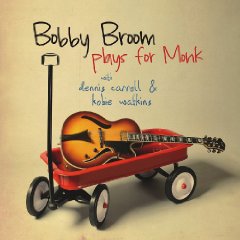
 |
|
By Jean Timmons It seems that every serious jazz musician wants to play Monk, and does. I can understand their motivations, but why should others listen to another recording of Monk's music? Consider for a moment that Monk's music is difficult to play engagingly, that is, dramatically. Brass players tackle it most often for the flights of atonal improvisation it allows them, prime opportunities to delve into harmonic abstractions. Now consider that Broom is a guitarist leading a trio consisting of a bassist (Dennis Carroll) and a drummer (Kobie Watkins). Getting interesting? If you're so inclined, this recording of Monk's music is not to be missed. Broom brings innovation and "play" into a mix and that makes all the difference.For this recording, Broom selected mainly Monk compositions. He also chose two songs that Monk included in his repertoire, i.e., "Lulu's Back in Town" and "Smoke Gets in Your Eyes." Of the Monk compositions, a few have never gone out of vogue, for example "Ruby, My Dear" and "Rhythm-a-ning," but others Broom revisits and adds a lovely coat of lacquer, for example, "Evidence," "In Walked Bud," and "Reflections.' But there's not a clinker in the lineup. "Ask Me Now," "Work," and "Bemsha Swing' all come under the magic of this trio. "Ask Me Now," which has been performed quite well by such musicians as Joe Henderson, provides a potent introduction to the trio and, particularly, to their ensemble sound. The total sound is affecting and comes together throughout the recording. Occasionally the trio reaches further and produces a few gems. The first one the group pushes further on is "Evidence." Drummer Watkins establishes a great groove for the bass and guitar to soon follow. The group dynamics are so dominant that it's difficult to identify the piece as a Monk. In contrast to "Ask Me Now," it moves very fast - this one swings. The drummer's enthusiasm is infectious in his great drum solo. As for the bass and guitar, they get into a back and forth conversation, for which I would love to get the translation but words, finally, aren't necessary. To slow the pace, the trio moves on to the old favorite, "Ruby, My Dear." The music suits Bloom and the guitar resonates. He needs no accompaniment really for the guitar fills in the spaces. For this reviewer, it was a similar feeling with "In Walked Bud," the second gem. On that piece, Bloom grabs hold and doesn't let go until the final note. It's a pleasure listening to that song, and it should remind jazz fans of Bud Powell and Monk. "Rhythm-a-ning" is noteworthy for the virtuosic playing of Broom. About it, he has said that he "realized an issue with this melody because playing the single-note lines didn't sound full enough in the context of the trio, so I wanted to play [Rhythm-a-ning] in chords . . . so now I have to play this and it's not slow!" Great results. Yet, the final gem is "Reflections." Perhaps it's because "Rhythm-a-ning' has had such play and "Reflections," for me, is not a common Monk composition. Its mood ranges from lyrical to melancholic. The drum work provides a different beat, one which seems a bit behind then before Broom. Bass sounds so heartfelt, a rather emotional sound. It's dynamic and I like this piece a lot. As for the entire program, Broom and trio play well for Monk. The Bobby Broom Trio plays a record release at the Green Mill Fri. - Sat. 8/7-8. Bobby Broom Trio - "In Walked Bud"
Check out Bobby's Web site |